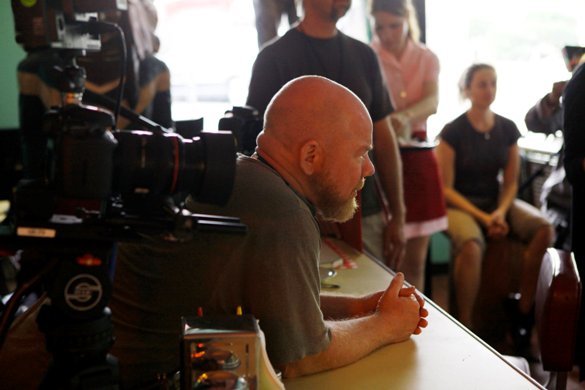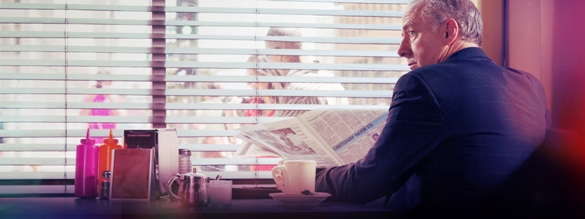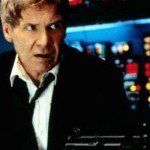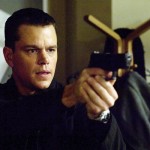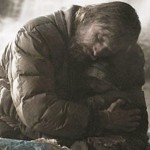Asking questions and recognizing the importance of asking questions is not, in my view, enough for people to come to epiphanies. The changes that stick, in my observation of others and myself, come about through the painful mess of doing things. Without the unexpected lessons of events, it is possible to live in the solipsism of therapies that flatter but do no more than coddle and reassure us. — Finally wrapping up my lengthy, enthralling, five-part conversation with Christopher “C.K.” Kubasik, creator and writer of The Booth at the End. It’s been an absolute blast, C.K. Easily the most TV-related fun I’ve had in years. Thanks for your time, and for all the great insights!
Joseph Susanka: “There are consequences” is a theme that comes up again and again throughout the show — the notion that we must confront the consequences of every action we humans undertake. But is there a side of the “moral divide” question you would hope (or expect) the show’s viewers to take? Are we meant to see their decisions as right or wrong, objectively? Or is the notion of “asking the question and recognizing the importance of asking” enough to serve as the driving force behind its troubled characters?
 Christopher “C.K.” Kubasik: People have accused the show of promoting relativism. I can’t understand this at all. Moral relativism assumes there is no way to judge right or wrong. But the show depends on the notion that weighing the choices of how to live is difficult. If there’s no right or wrong then those choices simply evaporate and the show makes no sense.
Christopher “C.K.” Kubasik: People have accused the show of promoting relativism. I can’t understand this at all. Moral relativism assumes there is no way to judge right or wrong. But the show depends on the notion that weighing the choices of how to live is difficult. If there’s no right or wrong then those choices simply evaporate and the show makes no sense.
I stumbled across a blog post some time ago by Alan Jacobs, writing about the work of J.R.R. Tolkien in response to comments Adam Gopnik has written about Tolkien’s work in The New Yorker magazine.
Here is a portion of Gopnik’s essay:
“Modernist ambiguity, or realist emotional ambivalence, is unknown to Tolkien—the good people are very good, the bad people very bad, and though occasionally a character may be tossed between good and evil, like Gollum, it is self-interest, rather than conscience, that makes him tip back and forth. Betrayal and temptation happen; inner doubts do not. Gandalf and Aragorn never say, as even the most patriotic real-world general might, ‘I don’t know which side I should be on, or, indeed, if any side is worth taking.’”
Jacobs responds:
“It’s okay not to like Tolkien—it really is—but what I find annoying is that so many of the people who criticize him do so by saying things that are manifestly untrue. It obviously is conscience that troubles Gollum, his awareness that Frodo is a “Good Master” who deserves to be obeyed or at least treated honestly. (Moreover, Gollum and Frodo are bound by a shared suffering.) While it’s true that Aragorn has no “inner doubts” about whether Sauron might be a nice guy after all, he is afflicted by many doubts about his own role in the story, his own fitness to lead. Boromir doubts the wisdom of the Council, and can’t overcome those doubts. The doubts of his father Denethor consume him and send him over the edge and into despair. And of course Gopnik has forgotten completely about Saruman, who at a slightly earlier stage in the story than the one told in LOTR proper was a leader among the Wise—along with Gandalf, Elrond, and Galadriel—before undergoing corruption.
“It has just become the tale that middle-to-highbrow critics tell—ever since Edmund Wilson was saying his own manifestly untrue things about Tolkien in the New Yorker fifty years ago—that Tolkien’s fictional world is morally simplistic and rigidly Manichaean. It may be true that the story of the Ring is less morally ambiguous than the average realistic novel, but that’s primarily because Tolkien wasn’t especially interested in the problem of knowing right from wrong. His concern was to explore the psychology of the moment when you know right from wrong but aren’t sure whether you have the courage and fortitude to do the right thing.”
I felt comfort when I read those words for I found an articulation of some of the things I’m scratching at with The Booth at the End. In particular in this sentence:
“[The] psychology of the moment when you know right from wrong but aren’t sure whether you have the courage and fortitude to do the right thing.”
If you look at a list of stories and plays that have last through the centuries there is a brutal honesty about how we can be good, and how we can be horrible, about how we choose to pay attention to our actions and their consequences—or not.
The key question of the show is this:
“Are you paying attention?”
The Man, by always digging at the characters, trying to get them to pay attention to their actions and decisions (instead of their justifications, equivocations, and excuses for their actions and decisions) is always trying to get the “client” focused on paying attention to what they are doing with their lives, their choices, the hours of their day.
That’s a question worth asking, I think. That’s why the show is set in a diner booth with two people talking. There aren’t a lot of distractions. We are listening to the characters words as they struggle to figure out what is right and wrong. And The Man is forcing the characters, because of his own curiosity, to listen to their own words and pay attention to what they are doing with their choices and with their days.
The answer to the question, “Are you paying attention?” matters because what we choose to do affects other people. And if we’re not paying attention, we’re affecting other people without being aware of it.
Thus, while the show doesn’t state which choice is the right choice, is does make it clear that we should be honest with ourselves and pay attention to the choices we make. That’s what The Man does to the characters time and time again—he forces the characters to peel away their self-serving, equivocating logic and actually look at what the choices we make are doing to other people. And that, I think, is something we don’t spend much time doing—but probably should.
* * *
In the second part of your question you asked, “Or is the notion of ‘asking the question and recognizing the importance of asking’ enough to serve as the driving force behind its troubled characters?”
I’m going to tackle this, but in doing so, I’m going to take a side-detour that you might not have intended.
I want to make it clear that while The Booth is dialogue driven, it is not just about asking questions and recognizing the importance of asking.
The Booth is not a little therapy session with The Man. The Man is harsh. The Man is demanding. The Man asks we pay attention not to our feelings but our actions.
The show is made out of talking, but if that’s all the show was, it would be just be philosophical babble—and inherently undramatic. I’m a storyteller first. That’s why an audience shows up and my first job is to deliver the goods on that promise. A story is about characters going through a bunch of experiences that test them and dump them out the other side changed in some way.
Asking questions and recognizing the importance of asking questions is not, in my view, enough for people to come to epiphanies. The changes that stick, in my observation of others and myself, come about through the painful mess of doing things. Without the unexpected lessons of events, it is possible to live in the solipsism of therapies that flatter but do no more than coddle and reassure us.
If The Booth at the End were about character sitting around and chatting until they had epiphanies—well, I would hate that show. It would be flaccid and precious. (And note: The show skates this edge all the time. Keeping it on track is no easy task.) The main problem would be that we would no longer be telling stories but doing—at best—philosophy in dialogue form. But, again, I’m not a philosopher. I’m a storyteller. And the audience showed up for stories. It also would put me, as writer, I the position of being High Priest dispensing wisdom to an audience, and I’m not in that business either.
The characters that interact with The Man are not just talking. They are out in the world doing things. We don’t see them doing these things, true. But the fact remains the conversations with The Man are utterly informed by the deeds done outside of the booth.

Thus, the show is not about intellectual abstractions. It’s about action and blood and conflict and violence and things going wrong. Why is this important? Again: because we’re here to make story. And that stuff is the stuff of story.
To explain this better, I’m going to bring in a quote from Walter Kerr’s fantastic book “How Not to Write a Play,” which has had an important influence on me as a writer. Kerr wrote the book in 1955 while he was a critic at the New York Herald Tribune. He went on to be the chief theater critic at the New York Times:
We know the audience yearns for extravagant event, but we are inclined to think of the yearning as one of the least attractive of the audience’s characteristics. It is a superficial desire for thrill; it is a primitive fondness for excessive color; it is a fairly shoddy form of escape, of sublimation, of vicarious romantic experience. It constitutes an unrealistic attitude toward life.
I’m not sure we understand this passion for excitement correctly. It may be a passion for reality, especially that reality which cannot be grasped in any other way.
Extravagant things, violent things, events of notable magnitude, do from time to time touch the outer edges of our lives. I suppose most of us have known suicides. A good many of us have married friends who do one another physical damage. People do cut one another up in bars. Each of us has heard the screech of brakes and some sort of thump, and then moved cautiously toward the crowds at the curbstone.
At this point, though, something happens to us. We are drawn toward the scene of violence by an immediate, unquestioning impulse. But the closer we approach it the more intense the counter-impulse becomes. Having shouldered our way to the edge of the spectacle, we are overcome by a powerful urge to turn away. We are simultaneously fascinated and repelled.
We are fascinated by something that is real. We are repelled because it is real. Whatever charity we may having in us, whatever sense of the ugly, whatever awareness that the victim is a person like ourselves, casts a veil over the event—over our clear sight of the event. Because we are humane, we deny ourselves a direct vision.
Our art forms are often concerned to show us with clarity those events that are much too tremendous to be seen clearly in life. Intense passions, at close range, involves us too much; in the theater we may watch it without direct involvement which obscures its meaning. The larger the event, the more likely we are to lose hold of it in life, and the more necessary it becomes for the theater to seize and shape it for us. If the greatest plays of the past are plays in which characters tear out their own eyes or one another’s eyes, in which characters kill or are killed, in which sons turn violently upon their mother or husbands upon their wives, it is not because the audience once asked for cheap stimuli but because audiences did ask to have their experience, their clear knowledge of life, enlarged.
Later in the book, Kerr points out he’s heard many people talk about love for the poetry in Shakespeare’s tragedies and histories (which ask questions and answer questions), but wish that the poetry wasn’t surrounded by deeds of murder, betrayal and lies. They like the pretty words and people talking about ideas, but not the deeds that prompt them.
 For example, here is a much beloved speech from “Macbeth:”
For example, here is a much beloved speech from “Macbeth:”
To-morrow, and to-morrow, and to-morrow,
Creeps in this petty pace from day to day
To the last syllable of recorded time,
And all our yesterdays have lighted fools
The way to dusty death. Out, out, brief candle!
Life’s but a walking shadow, a poor player
That struts and frets his hour upon the stage
And then is heard no more: it is a tale
Told by an idiot, full of sound and fury,
Signifying nothing.
There’s so much to say about this monologue — about how it’s written, about what it’s about. I’ll truncate the discussion and say it’s terrific writing about the tension of how much we invest in every desire and action of our days, and how they matter so little. And for many people, that’s enough — that’s all they would want it to be about and all they need.
However, the monologue actually begins with Macbeth speaking these words:
She should have died hereafter;
There would have been time for such a word.
And why does Macbeth begin is lovely and poetic and philosophical meditation with these words? Because a messenger just arrived with these words:
The Queen, my lord, is dead.
What prompts Macbeth’s meditation on life and its futility is the arrival of news of his wife’s death.
But Lady Macbeth did not just die. She committed suicide. And why did she commit suicide? Because guilt had overwhelmed her. And why had guilt overwhelmed her? Because she goaded Macbeth to kill their king and the two chamberlains who attended him.
Macbeth’s thoughtful speech is prompted by acts of regicide, murder and suicide.
In my view, if The Booth works — that is, holds an audience’s attention and works as a piece of both storytelling and dramatic narrative — it’s because it draws on the points Kerr outlined in the quote above and the tradition of storytelling illustrated by the passages from Macbeth. It is both horrific and reflective. I see no contradiction between these two things. In fact, I think one needs the other.
Shakespeare’s poetry arrives as the characters reach for words to explore their confusion and find answers. And all of that is prompted as the consequences of their desires and actions are made manifest in the world. Without the actions, without the danger, risk and consequence there would be truly nothing to motivate the talking.
The poetry would not begin.
* * *
 Without deeds, the words of the characters in The Booth would carry no weight. The show would be a babbling of sounds—esoteric, unanchored and abstract.
Without deeds, the words of the characters in The Booth would carry no weight. The show would be a babbling of sounds—esoteric, unanchored and abstract.
The show hangs on the risk, danger, consequence, and conflict of action. This is not only a matter of craft, though that is vital. It is, for me, the moral imperative of the show.
You’ll notice that while The Booth is built out of talking, I don’t trust talking very much. We are slippery creatures when it comes to words. That’s why The Man has to keep poking and prodding the characters that come to speak to him. They dodge; they deny; they equivocate. They use words to deflect or slip around the truth.
This is where the dramatic tension comes from: The Man wants the truth, while the clients want to meet their end of the bargain with as little truth as possible. They don’t want to pay attention to what they are doing; they don’t want to claim responsibility for what they are doing. Words are their weapons for not paying attention. The Man keeps them focused on their actual deeds.
The show is built on strange curly-cues of verbiage; tangling of sentence structure and rhetoric that The Man forces the characters to disentangle. (Note, too, The Man has his own dodges!)
The Man stringently enforces this issue: “What are the details?” he asks again and again. The details of the deeds and the details of moral thought prompted by those deeds. And this is what the show is about, ultimately — and what the camera is pointing us to: The characters struggling to figure out how they will behave and how they will treat people once all their talking and babbling and justifications and excuses are stripped away.
Want to catch up on the whole conversation? Go here!
Attribution(s): Publicity images and film stills are the property of Hulu and other respective production studios and distributors, and are intended for editorial use only; images of Mr. Kubasik were provided by C.K. himself; Walter Kerr’s “How Not to Write a Play” is a product link, courtesy of Amazon; “Sand Sméagol” via Getty Images, which allows the use of certain images “as long as the photo is not used for commercial purposes (meaning in an advertisement or in any way intended to sell a product, raise money, or promote or endorse something);””Macbeth and Banquo with the Witches” by Henry Fuseli, licensed under Public Domain via Wikimedia Commons; “Matrix-ish” provided by Shutterstock.

